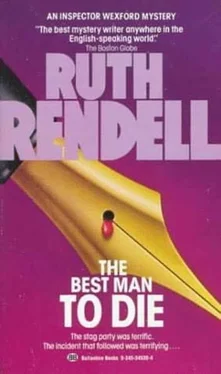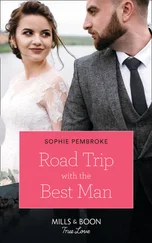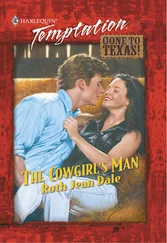Ruth Rendell - The Best Man To Die
Здесь есть возможность читать онлайн «Ruth Rendell - The Best Man To Die» весь текст электронной книги совершенно бесплатно (целиком полную версию без сокращений). В некоторых случаях можно слушать аудио, скачать через торрент в формате fb2 и присутствует краткое содержание. Жанр: Детектив, на английском языке. Описание произведения, (предисловие) а так же отзывы посетителей доступны на портале библиотеки ЛибКат.
- Название:The Best Man To Die
- Автор:
- Жанр:
- Год:неизвестен
- ISBN:нет данных
- Рейтинг книги:4 / 5. Голосов: 1
-
Избранное:Добавить в избранное
- Отзывы:
-
Ваша оценка:
- 80
- 1
- 2
- 3
- 4
- 5
The Best Man To Die: краткое содержание, описание и аннотация
Предлагаем к чтению аннотацию, описание, краткое содержание или предисловие (зависит от того, что написал сам автор книги «The Best Man To Die»). Если вы не нашли необходимую информацию о книге — напишите в комментариях, мы постараемся отыскать её.
The Best Man To Die — читать онлайн бесплатно полную книгу (весь текст) целиком
Ниже представлен текст книги, разбитый по страницам. Система сохранения места последней прочитанной страницы, позволяет с удобством читать онлайн бесплатно книгу «The Best Man To Die», без необходимости каждый раз заново искать на чём Вы остановились. Поставьте закладку, и сможете в любой момент перейти на страницу, на которой закончили чтение.
Интервал:
Закладка:
‘You returned to your parents?’
Nora Fanshawe raised her head and for the first time he saw her smile, an ugly harsh smile of self-mockery. ‘You’re a cold fish, aren’t you?’ she said surprisingly.
‘I was under the impression you despised sympathy, Miss Fanshawe.’
‘Perhaps I do. Want some more coffee? No, nor do I. Yes, I went back to my parents. I was still sorry for my mother, you see. I thought my father was older now and I was older. I knew I could never live with them again, but I thought… Family quarrels are uncivilized, don’t you think? My mother was rather pathetic. She said she’d always wanted a grown-up daughter to be real friends with.’ Nora Fanshawe wrinkled her nose in distaste. ‘Even upstage reserved characters like myself have their weak spots, Chief Inspector. I went to Eastover with them.’
‘And the quarrel, Miss Fanshawe?’
‘I’m coming to that. We’d been on surprisingly good terms up till then. My father called my mother darling once or twice and there was a kind of Darby and Joan air about them. They wanted to know what I was doing about getting another job and all was serene. So serene, in fact, that after we’d had a meal at the bungalow and a few drinks my mother did something she’d never done before. My father had gone off up to bed and she suddenly began to tell me what her life with him had been, the bribery and the humiliation and so on. She really talked as if I were a woman friend of her own age, her confidante. Well, we had about an hour of this and then she asked me if I had any romantic plans of my own. Those were her words. Like a fool I told her about the man I’d been living with. I say like a fool. Perhaps if I hadn’t been a fool I would have been the dead girl in the road.’
‘Your mother reacted unsympathetically?’
‘She goggled at me,’ said Nora Fanshawe, emphasizing the verb pedantically. ‘Then, before I could stop her she got my father out of bed and told him the whole thing. They both raved at me. My mother was hysterical and my father called me a lot of unpleasant names. I stood it for a bit and then I’m afraid I said to him that what was sauce for the gander was sauce for the goose and at least I wasn’t married.’ She sighed, moving her angular shoulders. ‘What do you think he said?’
‘It’s different for men,’ said Wexford.
‘How did you guess? At any rate, for once my parents presented a united front. After my mother had obligingly betrayed all my confidences to him in my hearing, he said he would find the man – Michael, that is – and compel him to marry me. I couldn’t stand any more, so I locked myself in my bedroom and in the morning I went to Newhaven and got on the boat. I parted from my mother just about on speaking terms. My father had gone out.’
‘Thank you for unbending, Miss Fanshawe. Have you been suggesting that the dead girl might have been your father’s mistress?’
‘You think it impossible that my father would drive his wife and mistress together to London? I assure you it’s not unlikely. For him it would simply have been a matter of bringing the girl along, telling my mother she was coming with them and paying her handsomely for the hardship occasioned.’
Wexford kept his eyes from Nora Fanshawe’s face. She was as unlike his Sheila as could be. They had in common only their youth and health and the fact, like all women, of each being someone’s daughter. The girl’s father was dead. In a flash of unusual sentimentality, Wexford thought he would rather be dead than be the man about whom a daughter could say such things.
In a level voice he said, ‘You gave me to understand that as far as you know there was no woman at the time but your mother. You have no idea who this girl could be?’
‘That was the impression I had. I was evidently wrong.’
‘Miss Fanshawe, this girl clearly could not have been a friend or neighbour at Eastover whom your parents were simply driving to London. In that case her relatives would have enquired for her, raised a hue and cry at the time of the accident.’
‘Surely that would apply whoever she was?’
‘Not necessarily. She could be a girl with no fixed address or someone whose landlady or friends expected her to move away about that particular weekend. She may be listed some where among missing persons and no search have begun for her because the manner of her life showed that occasional apparent disappearances were not unusual. In other words, she could be a girl who led a somewhat itinerant life in the habit of taking jobs in various parts of the country or moving about to live with different men. Suppose, for instance, she had spent the weekend in some South Coast resort and tried to hitch a lift back to London from your father?’
‘My father wouldn’t have given a lift to anyone. Both he and my mother disapproved of hitch-hiking. Chief Inspector, you’re talking as if everyone in that car is now dead. Aren’t you forgetting that my mother is very much alive? She’s well on the way to recovery and her brain isn’t affected. She insists there was no one in the car but my father and herself.’ Nora Fanshawe lifted her eyes and her voice lost some of its confidence. ‘I suppose it’s possible she could be having some sort of psychological block. She wants to believe my father was a changed man, that no girl was with them, so she’s convinced herself they were alone. That could be it.’
‘I’m sure it must be.’ Wexford got up. ‘Good night, Miss Fanshawe. Thank you for the coffee. I take it you’ll be staying here a few days?’
‘I’ll keep in touch. Good night, Chief Inspector.’
The next step, he thought as he walked home, would be to investigate the missing persons list in the holiday towns and London too, if those proved fruitless. That was routine stuff and not for him. Why, anyway, was he following this road accident that wasn’t even properly his province to distract his mind from the urgency of the Hatton affair? Because it had features so distracting and so inexplicable that no-one could simply explain them away?
Of course it would turn out that the dead girl was merely someone Jerome Fanshawe had come across that weekend and who had taken his fancy. Nothing so dramatic as Nora Fanshawe had suggested need have happened. Why shouldn’t Fanshawe just have said to his wife, ‘This young lady has missed her last train and since she lives in London I said we’d give her a lift’? But in that case Mrs Fanshawe would hardly deny the girl’s presence.
There was more to it than that. There was the handbag. Camb had searched that handbag and found in it nothing but make-up and a little money. That wasn’t natural, Wexford reflected. Where were her keys? Come to that, where were all the other things women usually stuff into bags, handkerchiefs, dress shop bills, receipts, tickets, pen, letters? The things which were there were anonymous, the things which were not there were the objects by which someone might be identified.
Wexford let himself into his own house and the dog Clytemnestra galloped to meet him.
‘What would you do,’ Wexford said to his wife, ‘if I brought a young girl home and offered you a thousand pounds to let her stay?’
‘You haven’t got a thousand pounds,’ said Mrs Wexford.
‘True. There’s always a fly in the ointment.’
‘On the subject of young girls and money, Mr Vigo has sent a whacking bill for your daughter’s tooth.’
Wexford looked at it and groaned. ‘Pleached walks!’ he said. ‘Chinese Chippendale! I just hope one of my customers pinches his orrery, that’s all. Is there any beer in the house?’
Suppressing a smile, his wife stepped over the now recumbent form of the knitted dog and went into the kitchen to open a can.
Читать дальшеИнтервал:
Закладка:
Похожие книги на «The Best Man To Die»
Представляем Вашему вниманию похожие книги на «The Best Man To Die» списком для выбора. Мы отобрали схожую по названию и смыслу литературу в надежде предоставить читателям больше вариантов отыскать новые, интересные, ещё непрочитанные произведения.
Обсуждение, отзывы о книге «The Best Man To Die» и просто собственные мнения читателей. Оставьте ваши комментарии, напишите, что Вы думаете о произведении, его смысле или главных героях. Укажите что конкретно понравилось, а что нет, и почему Вы так считаете.












